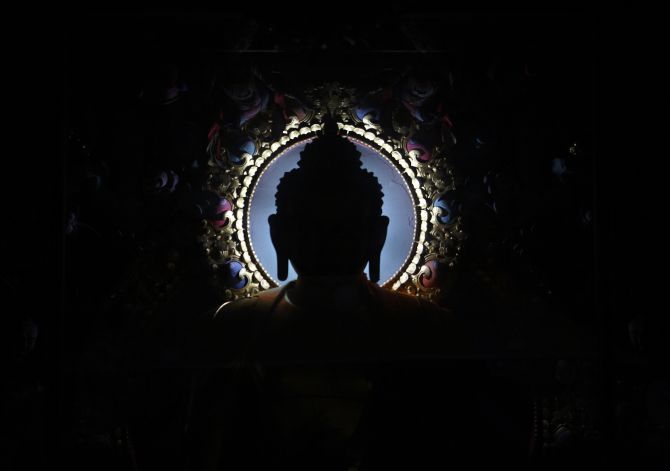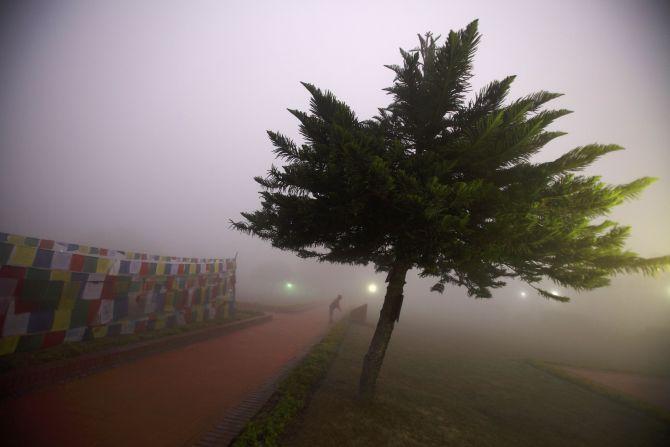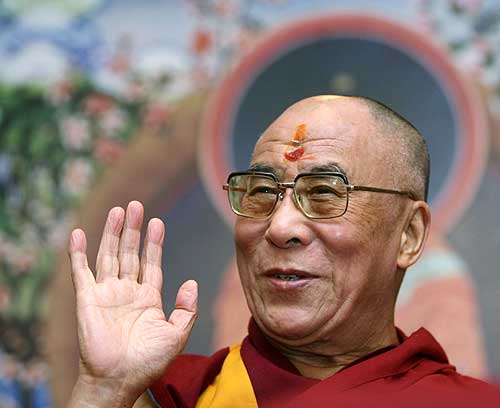For India to endorse Nepal's Buddhist conference will be like sipping from a poisoned chalice, warns former RA&W official Jayadeva Ranade.

Media reports claim that Nepal's government is organising a three-day international Buddhist conference in Kathmandu from May 19-21, 2016, on the occasion of the 2560th Buddha Jayanti, Lord Buddha's birthday.
The objective of the conference is to obtain support for the development of Lumbini as a spiritual centre and to promote Nepal's religious and cultural tourism.
For India to endorse this conference will be like sipping from a poisoned chalice.
Hundreds of monks, scholars and representatives of governments have been invited by the 501-member committee headed by Ananda Prasad Pokharel of the Communist Party of Nepal (Unified-Marxist- Leninist) and Nepal's minister for culture, tourism and civil aviation, to the conference where Lumbini has been advertised as the 'the cradle of Buddhist philosophy' -- though it is Bodh Gaya where the Buddha attained enlightenment!
United Nations Secretary General Ban Ki-moon, a practicing Buddhist who in the past supported a China-backed Buddhist centre in Lumbini, has been invited as have India's Prime Minister Narendra Modi and China's President Xi Jinping.
The pro-Dalai Lama, Delhi-based International Buddhist Confederation, has also been invited though India gains nothing from the venture.
China has for many years been trying to establish a presence in Buddha's birthplace Lumbini as part of its efforts to ensure that Nepal is not used as a base to destabilise the Tibet Autonomous Region as well as to undermine the Dalai Lama's influence and fracture the cohesiveness of Tibetan Buddhist sects and the Tibetan community in exile.
As a visiting senior Chinese official told a Nepalese journalist a few years ago, 'We visit Nepal because you have Lumbini, the birthplace of Buddha.'
Chinese NGOs have earlier also attempted to get India's endorsement for the development of Lumbini. Their plans include building hotels, an airport and, most importantly, to develop Lumbini as a China-backed centre of Tibetan Buddhism.
In 2012, the Asia-Pacific Exchange and Cooperation Foundation, promoted by the Chinese Communist Party's United Front Work Department, unveiled a $3 billion plan for the development of Lumbini.
Included were a Chinese-financed and managed monastery providing religious instruction and free for all monks from the region. It additionally proposed to allocate plots of land to various Tibetan Buddhist high lamas and sects.

More recently the Beijing-headquartered China Buddhist Association, of which the Beijing-selected 11th Panchen Lama Bainqen Erdini Qoigyijabu is the vice- president, announced it would take over the $3 billion project for the development of Lumbini.
While its proposal is less ambitious, it nevertheless still envisages an airport and the allocation of plots of land to various Tibetan Buddhist high lamas and sects.
Construction of the airport, probably by Chinese army engineers, will entail their long-term presence on India's doorstep. Thirty five Beijing-financed China Study Centres are already strung along Nepal's border with India.
As part of their effort, Chinese government-sponsored NGOs have been trying to co-opt prominent Nepal politicians. The Asia-Pacific Exchange and Cooperation Foundation and the International Ecological Safety Collaborative Organisation appointed Pushpa Kamal Dahal -- better known as Prachanda, chairman of the Unified Communist Party of Nepal -- Madhav Kumar Nepal (CPN-UML) and Sujata Koirala (Nepal Congress) to their boards.
The emphasis on free food, lodging and religious instruction in a Chinese-financed and staffed monastery to monks in the region implies that all monks, mainly the Tibetan Buddhist monks who reside in the Indo-Himalayan border belt, are eligible. It will be a major incentive.
The proposed allocation of plots of land to various Tibetan Buddhist high lamas and sects requires to be viewed in the backdrop of statements revealing Beijing's pervasive influence over Nepal and particularly in allowing any activities by Tibetan Buddhists in Lumbini.
In 2012, Nepal's then culture minister, Dr Minendra Rijal of the Nepali Congress, said the Dalai Lama might visit Lumbini sometime in the future after 'the leadership of China will find ways to deal with His Holiness the Dalai Lama, which will be respectful of the Chinese people.'
This was later repeated by a member of the Greater Lumbini National Development Directive Committee. It is apparent that the allocation of plots will be as selective as permission to Tibetan Buddhist sects to organise religious ceremonies in Lumbini and entail a degree of accommodation with the Chinese Communist Party. The security implications for India are obvious.
This latest effort to get endorsement for developing Lumbini coincides with the bitterness that now permeates Nepal's relations with India and which got accentuated after the almost 5-month blockade imposed by the Madhesis on Nepal. The blockade gave impetus to the definitive pro-China policies initiated by Prachanda.
Nepal's Prime Minister Khadga Prasad Sharma Oli has made no secret of his antipathy for India as evident by the manner in which he extolled the 'achievements' of his trip to Beijing immediately after his visit to India and the 10 agreements he signed there. Nepal's politicians, elite and a large section of the population are more comfortable with closer ties with Beijing.
While it will be at least a decade before rail and road links connecting China with Nepal are completed and China can provide Nepal essential commodities on the required scale, retrieving the earlier India-Nepal relationship will be an arduous task.
As an insightful observer of Nepalese politics recently confided: "Even if on the ground China cannot replace India for many years, in the hearts of the Nepalese, China has already replaced India!"
Jayadeva Ranade, former Additional Secretary in the Cabinet Secretariat, Government of India, is President of the Centre for China Analysis and Strategy.













